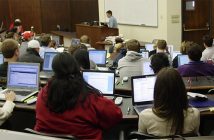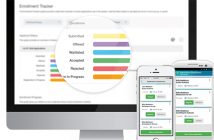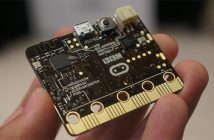
(Photo: Wilfred Iven, Creative Commons)
According to a report recently released by the World Economic Forum, the students of today need more than a traditional academic education in order to succeed in the 21st century.
The report, “New Vision for Education: Fostering Social and Emotional Learning through Technology,” says that students need to succeed in the areas of collaboration, communication, and problem-solving, which the authors say are all skills developed through social and emotional learning (SEL).
A separate report published in 2015 by the WEF focuses on the gap in skills currently present and how to address the issue through technology. The authors developed 16 proficiencies they consider to be crucial for education in the 21st century, including “foundation literacies” such as literacy, numeracy and scientific literacy, as well as “character qualities,” or “competencies,” or how students look at complex challenges. These include collaboration, communication, critical thinking, problem solving, curiosity, adaptability, and social and cultural awareness.
The recent report is a follow-up to the previous one and looks at how character qualities and competencies do more than aid in the creation of skills for the workplace. The authors believe these skills to be just as important as the skills required for traditional academic learning, saying they are critical for success in the workplace. One estimate states that 65% of children who enter grade school will obtain jobs that do not yet exist today, which the authors say makes creativity, initiative, and adaptability especially important skills to have.
A separate study reports that jobs are becoming increasingly dependent on social skills, causing the authors to believe SEL will prepare students for the changing workplace.
In addition, they say SEL has positive effects on academic learning, as studies have shown that students who receive such an education had achievement scores with an average of 11 percentage points higher than those who did not. SEL has also been shown to lead to other long-term benefits including higher rates of employment and educational attainment.
The authors stated that education technology plays an important role in the efficient implementation of SEL.
“We see technology as a tool that a parent, educator or caregiver can use to complement and extend the learning experience – especially given the host of emerging technologies that go beyond traditional screens. These innovations are capable of mixing the physical and virtual worlds and facilitating forms of human interaction impossible a decade ago. Technologies such as virtual, augmented and “mixed” reality; robots; video chats on mobile devices; and virtual tutors allow for a much less passive and more interactive experience.”
Over 2,000 educators and parents around the world were surveyed for the report in an effort to create a high-priority list of the learning strategies and technology features that are most important to the promotion of SEL.
Parents, educators, and caregivers need to use education technology products already in existence that contain features that promote SEL, the authors suggest. In addition, they say that new products need to have SEL features embedded into them that support foundational academic skills and can extend SEL to other areas.
They also suggest that new innovative technologies such as wearable devices and virtual reality can help students master important social and emotional skills.




